It’s no mystery why many discover a love for creative pursuits as older adults. Retirement is a distinct period in your life when responsibilities wane, life slows down, and you have the free time to delve into new experiences. While creative interests are often sidelined during the years centered around a career and family, many embrace them later in life.
“What many don’t know about creative hobbies is how profoundly they can improve your cognitive and mental health,” says Lynda Marino, marketing director for Canterbury Woods Gates Circle. “Older adults looking to sharpen their mind and boost their mood can do so through engagement in the arts.”
This blog will teach you about the many ways creative retirement hobbies boost cognitive function and improve mental health. It will also offer suggestions for what kind of hobbies you could pursue and how to get started.
Cognitive Health Benefits of Creative Hobbies
Learning new things is great for brain health because it creates new neural connections and grows new brain cells. But there’s something uniquely powerful about the effect of creative hobbies. Creative endeavors exercise parts of the brain that don’t get as much activity in day-to-day life and encourage the interaction of large-scale brain systems.
Here are some cognitive health benefits of creative play:
- It increases brain plasticity: The connections created through creative action literally make your brain more resilient to change. This neuroplasticity supports future learning and can even help the brain recover from damage.
- It improves memory: Pathways to the hippocampus are strengthened through creativity. Since the hippocampus plays a major role in memory, this boosts your ability to access past experiences.
- It offers a way for those with dementia to express themselves: Creative activity is a common aspect of the multidisciplinary treatment used to address dementia. It can help older adults reconnect with their personalities and sharpen their senses.
- It prevents cognitive impairment: A Mayo Clinic study that evaluated the benefits of various activities in middle- and older-aged adults concluded participants who engaged in creative hobbies were 73% less likely to develop mild cognitive impairment.
Mental Health Benefits of Creative Hobbies
The connection between creativity and improved mental health is so widely accepted that mental health professionals recommend it almost as a prescription. Creativity has a special way of tapping into the carefree times of your youth and allowing you to express and explore parts of yourself that are less accessible through other means.
Here are some positive mental health outcomes from creativity:
- It reduces stress and increases calm: A hobby like painting can be almost meditative, creating calm and mindfulness. Both learning new techniques and becoming attuned to details require a concentration that shifts your attention from the things that cause you stress to an enjoyable activity.
- It boosts self-esteem and confidence: Creative pastimes can be immensely personal. They can even be a gateway into self-discovery. Along with the confidence gained when you experience improvement in skill, the exploration of creativity can improve your overall self-concept.
- It decreases depression: Especially when a creative endeavor can be combined with social interaction, it can have a positive effect on symptoms of depression. This may be due to increased levels of dopamine in the body.
Types of Creative Hobbies to Try
- Painting: Painting for seniors is a fairly popular hobby and is often offered at senior living communities and community centers. Art classes like these have been shown to promote independence and even lower blood pressure.
- Writing: Writing workshops can help seniors access memories and work through difficult experiences. By documenting your life, you could even create a keepsake that younger generations could appreciate.
- Knitting and Crochet: Yarn art can improve hand-eye coordination and promote relaxation. Check out Ravelry for interesting patterns and projects you can create for family and friends.
- Nature Photography: This pastime combines the benefit of being outdoors with the joy of simply noticing beauty. Learning to quiet yourself and look for details to capture with your camera can be immensely gratifying.
- Make Music: Whether you join a choir, pick up an instrument you used to play, or start from scratch with a brand-new musical interest, music is one fun creative endeavor – and it’s even been shown to make you smarter.
How to Start a Creative Hobby
Join or start a club: If you are developing an interest in a certain art form, it sometimes happens that your enthusiasm spreads. Maybe you already have people in your life who will join you on your learning journey. If not, you can always look at community center, church and library websites to see if there’s an already existing group. Senior living communities often host interest groups too.
Take a class: Often when you think about taking a class to learn something, you’re thinking of an official program you enroll in. You might find an art class like this through your county parks and rec department, or a local museum or community college. You might find something less formal at a painting party or at a ceramics cafe.
Of course, residents of a senior living community like Canterbury Woods Gates Circle don’t have to look far. Art classes that introduce seniors to hobbies like drawing, painting and sculpting are offered regularly right outside your door.
Use online resources: It is common for people to learn online in this new virtual world. Resources that can help you learn the basics or grow your skills are increasingly available to you with the push of a button. You can access virtual courses or one-off tutorials from the comfort of your home and complete a creative project by yourself or with a group of friends.
Learn from a friend or family member: We associate creative hobbies with those in our life who enjoy them. You likely know someone with a passion for a creative hobby who would be willing to share what they know about their pastime. This sort of shared experience can forge friendships and strengthen bonds.
Arts at Canterbury Woods Gates Circle.
At Canterbury Woods Gates Circle, residents can take on-site arts and crafts classes designed to enhance their life and improve their health. We are a Life Care Community offering a full continuum of care as well as an array of activities, interest groups and creative opportunities to residents. Come visit to discover how our dynamic environment can keep you learning and growing.




